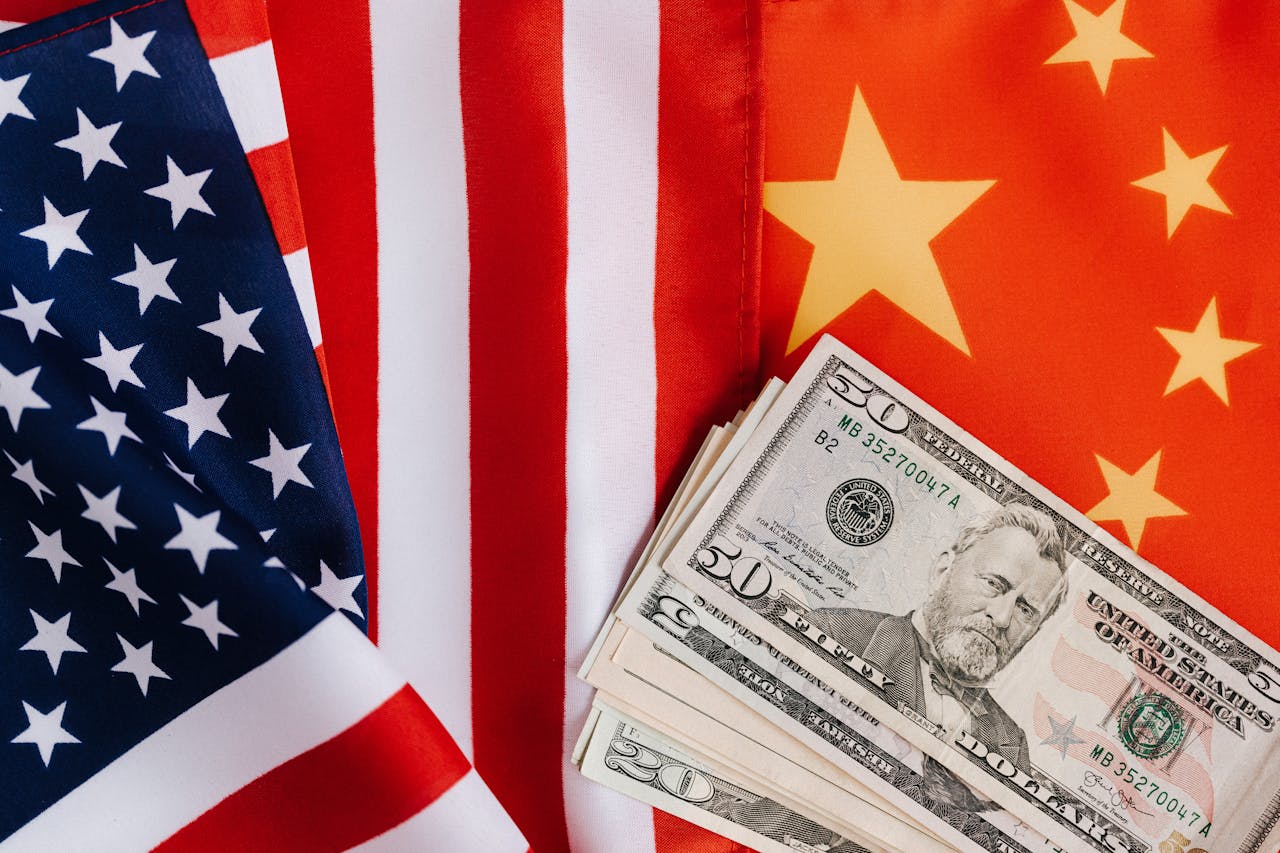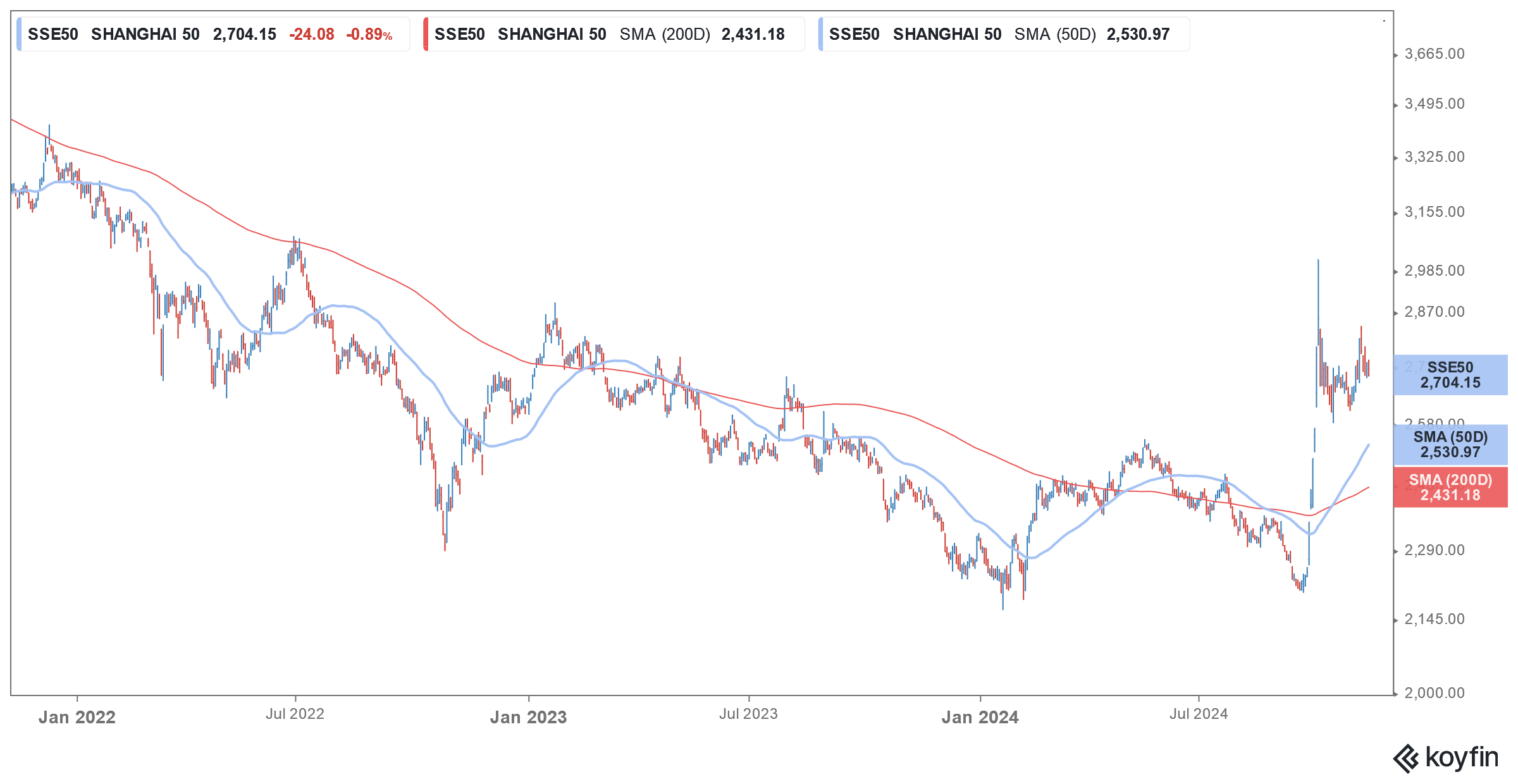
Morgan Stanley and Goldman Sachs have turned cautious on China as the stimulus-driven rally in Chinese shares has faded away. While Chinese shares outperformed in September after the country started unveiling a flurry of flurry of stimulus measures, they have since looked under pressure and some analysts turned wary of Chinese shares after Donald Trump’s election as the 47th US president.
In their note, Morgan Stanley analysts wrote, “We see a low limited chance that China’s government will front-load enough fiscal stimulus to target consumption and housing in 2025 due to concerns over moral hazard and a premature transition into a ‘welfare state.’” They added it presents “even stronger headwinds on corporate earnings and market valuation in the coming months.”
Morgan Stanley turns cautious on China
Morgan Stanley set its 2025 target for the MSCI China Index stands at 63 which is slightly below what it closed at on Friday. The brokerage set a base case 2025 target of 4,200 for China’s CSI300 which is almost 5% lower than where the index currently stands. It projects the Hang Seng at 19,400, slightly below Monday’s 19,655.
Goldman Sachs on the other hand sees CSI300 at 4,600 by the end of 2025 even as it expects weakness in Hong Kong-listed shares and downgraded them to underweight.
“Although valuations are not demanding, Hong Kong does not offer much economic or earnings growth,” said Goldman analysts in an Asia-Pacific portfolio strategy note.
They added, “The property and retail sectors remain under pressure and the economy may not benefit as much from policy support in China as it previously has, given China’s focus on bolstering the domestic economy.”
Incremental Chinese stimulus has failed to impress
While Chinese shares rose sharply in September after China unveiled monetary policy stimulus and promised more measures to support its sagging economy, the subsequent announcements have failed to impress.
China announced the most recent stimulus earlier this month after the parliament meeting concluded. The package, which is worth 10 trillion yuan (around $1.4 trillion) and is spread across five years, is meant to tackle the burning issue of local government debt and would allow them to borrow more to spur growth.
However, the mega debt swap program fell short of market expectations which expected the country to announce more measures, especially with Donald Trump set to return to the White House next year.

China’s debt swap plan failed to impress
Nomura analysts led by Ting Lu said that while the debt swap would help local governments to save on interest costs and prompt them to borrow more, it is not exactly a stimulus as it is not additional borrowing.
“It seems Beijing needs more time to come up with more exact numbers for fiscal stimulus in coming months, and perhaps more detailed measures will only be released in the annual [National People’s Congress] conference in March 2025,” said Nomura analysts in their note.
Meanwhile, some analysts see more scope for stimulus. “While the market may have to wait for more substantial policy changes, the potential for future monetary and fiscal measures remains,” said Chaoping Zhu, Shanghai-based global market strategist at J.P. Morgan Asset Management.”
The Chinese economy is facing a structural slowdown
Zhu added, “Factors such as a deep stock market correction, export headwinds, or mounting fiscal pressures on local governments could serve as catalysts for policy escalation.”
Larry Hu, chief China economist at Macquarie also echoes similar views and said that China would wait for how US trade policy evolves under Trump before announcing more fiscal measures.
While these are still early days, data shows that Chinese stimulus hasn’t had much impact on the country’s sagging economy and the country’s October consumer inflation rose at the slowest pace in four months.
While the rest of the world was battling with multi-year high inflation, Chinese inflation was quite benign and the country was instead worried about deflation. Benign inflation provides legroom to the Chinese central bank to ease its monetary policy, unlike in most other countries where inflation still remains a concern.
Notably, the bulk of the wealth of Chinese households is tied to the real estate sector which is under massive stress. This is prompting Chinese consumers to hold back on their purchases.
Chinese real estate shares jumped on the reports of the government providing a stimulus to the sector. Incidentally, in the past Chinese President Xi Jinping has spoken against speculation in the housing sector. He also clamped down on the tech sector but the government has since taken a much more conciliatory stance amid the worsening slowdown.
Meanwhile, while the country has announced several measures to revive the housing sector they are yet to show meaningful impact.
Chinese shares could be volatile under a Trump presidency
US-China trade relations will be in focus during Trump’s presidency. In their note, UBS Global Wealth Management said that Trump’s return “raises the probability of very large tariffs on Chinese exports to the US and challenges the outlook for Chinese stocks.”
The brokerage also warned of a “sentiment impact” and potential downgrade in valuation multiples. “It’s much broader because this is the second derivative of the tariff impact. It’s not just the company itself, [but also] local sentiment consumption and capital-expenditure investments,” said UBS in its note.
Morgan Stanley believes that Trump could use his executive powers to impose tariffs and that “it’s not unreasonable for markets to price in a variety of scenarios and related growth pressures.”
Meanwhile, Chinese shares are already in correction territory after having fallen over 10% from their recent highs and now risk falling into a bear market. With incremental stimulus announcements failing to meet market expectations, Chinese markets have pared gains even as they are still higher than what they were before the country started unleashing its stimulus program.

Question & Answers (0)